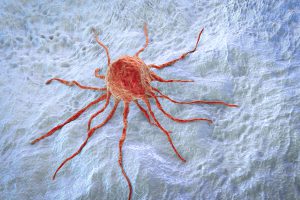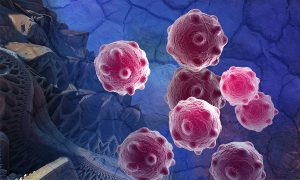
Cancer cell close-up view
The debate about soursop as a cancer cure
Soursop has a long history of being used to fight cancer naturally. People who live in tropical climates and have readily accessible soursop fruit (guanabana) that’s grown locally. The tree is often found in people’s backyards.
The fruit tree’s leaves has long been used to make soursop tea. The raw fruit is also eaten daily in an effort to treat their cancer to beat the disease.
Caribbean Islanders similarly relate to soursop the way people from the Middle East relate to Black Seed Oil, which is said to “cure everything except death”.
If you ask any Caribbean islander, most know someone who has consumed soursop fruit, leaves or related graviola byproducts to cure cancer. Western medicine does not wholly support these claims, saying there is no absolute evidence that graviola or soursop works as a cure for cancer.
The claims are anecdotal, but there is some science that is showing promise to prove that soursop is a definitive cancer killer.
The science of soursop’s cancer fighting reputation
Claims that soursop – or graviola as some call it, or guanabana in Spanish – is an all natural cancer fighter has some basis in science and lab research.
The anti-cancer claims associated with soursop come from more than 20 laboratory studies. They have shown soursop extracts to be effective against killing a range of cancer cell lines, including:
- breast cancer
- lung cancer
- colon cancer
- prostate cancer
- liver cancer
- pancreatic cancer
- skin cancer.
- And many more types of cancer.
The studies show that soursop may have the ability to kill malignant cells in 12 different types of cancer. The active ingredient is thought to be a type of plant compound (phytochemical) called annonaceous acetogenins.
(Note that guanabana, soursop and graviola are all common words for the scientific name of the plant Annona muricata).
Although test-tube and animal research demonstrates that graviola may be an anti-cancer agent, there have been no clinical trials or studies in humans, and therefore the use of graviola for cancer treatment remains controversial and subject to much debate.
The curative magic of phytochemicals
At the heart of the cancer research is an examination of a compound group known as phytochemicals.
The phytochemical of interest to researchers is called asannonaceous acetogenins. Studies show that annonaceous acetogenins has potent anti-tumor properties. It exhibits selective toxic properties against tumor cells. Further clinical studies also demonstrated the powerful anti-cancerous, anti-tumorous, and antiviral properties of annonaceous acetogenins.
Recent studies have found that natural compounds of graviola, acetogenins have superb properties to inhibit the enzyme processes that are specifically present in membrane of cancerous cells. Through this mechanism of action they are toxic for cancerous cells and don’t create toxicity in healthy cells.
However, a word of caution, no studies have yet been conducted with humans to show that soursop consumption is indeed an effective cancer inhibitor. That said, animal studies have shown extracts from the leaves can have anti-inflammatory, analgesic, antidiabetic, antiulcer and antiviral effects.
Proof of soursop’s curative powers could come from clinical trials where cancer patients are treated with the fruit compounds. No have been conducted to date.
This may also interest people seeking wealth: http://livingwealth.com

Soursop’s tumor killing abilities
The National Cancer Institute has also explored the toxic effects of Graviola against cancerous cells in a plant screening program in 1976. They discovered that the graviola stem and leaves demonstrated active toxic effects against cancer cells.
- lung carcinoma cell lines,
- prostate adenocarcinoma
- breast tumor lines
- liver cancer cell lines
- pancreatic carcinoma cell lines
- colon adenocarcinoma cell lines
- and multidrug resistant breast adenocarcinoma.
In laboratory studies, graviola extracts can also kill some types of liver and breast cancer cells that are resistant to particular chemotherapy drugs.
What’s the bottom line? Can soursop cure cancer?
It appears that consuming soursop may help cancer patients fight their disease, even if scientists have yet to definitively prove it.
How to fight cancer with soursop
- Drink tea made from soursop leaves one to three times per day with meals
- Eat fresh soursop fruit daily (buy fresh guanabana/soursop fruit here)
Where to buy graviola or soursop products
Learn more about where to buy soursop and graviola products. Here is a good list, to get you started. Plus read on.
Soursop leaves
Wild, hand-picked and naturally organic soursop leaves are available here. They are sun-dried, organic and ready for tea making.
Fresh soursop fruit
Order fresh soursop fruit from our family farmers in Grenada (in the Caribbean), delivered to you in the US by air 2 days after picking:
Vacuum sealed soursop pulp in a jar
Available on Amazon. It has a shelf life of a year in its sealed glass container. See our Gfruit review.
Additional soursop and cancer resources:
- The alternative medicine pawpaw and its acetogenin constituents suppress tumor angiogenesis via the HIF-1/VEGF pathway
- Graviola and cancer
- Experts caution against soursop
- Soursop graviola cancer-cure strong evidence
- Heath Sciences Institute: Graviola and Cancer
- Can graviola cure cancer?
- Peruvian tree compound 10000x effective than chemo drug
- Graviola tree is a miraculous natural cancer cell killer
- https://www.mskcc.org/cancer-care/integrative-medicine/herbs/graviola
- Research papers on graviola

